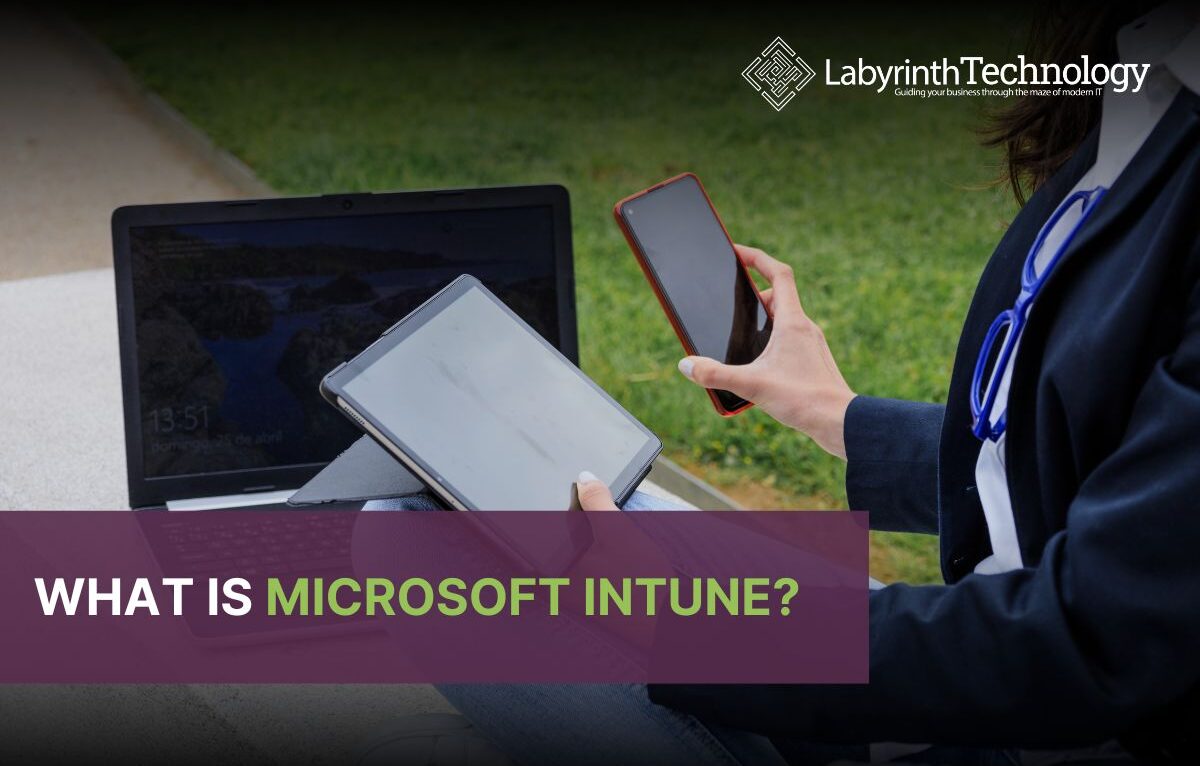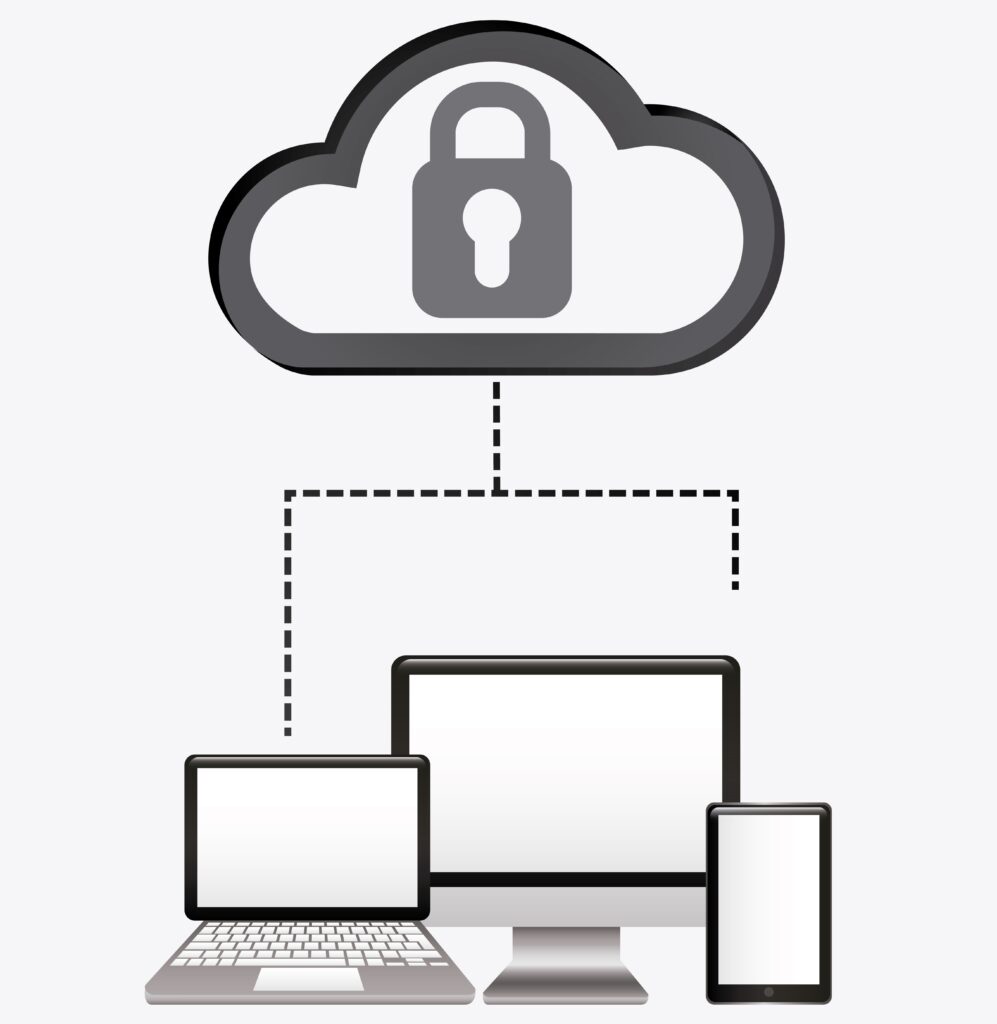
When you think of Microsoft, it’s likely that products like Word, Excel, and Teams spring to mind immediately. Their familiarity is hard to ignore, given how they have become synonymous with day-to-day business operations. However, there’s another powerful tool in the Microsoft ecosystem that doesn’t enjoy the same level of name recognition, but is no less valuable—especially for small and medium-sized enterprises (SMEs). Meet Microsoft Intune. If you haven’t come across it yet, or if you’ve just heard it mentioned in passing, this might be a good time to discover what it can offer your business. Trust me, it’s worth your attention.
Microsoft Intune may not be as well-known as Microsoft’s flagship products like Office 365 or Teams, but for businesses, especially those with hybrid or remote work setups, it’s an invaluable tool. Essentially, Intune is a cloud-based service focused on mobile device management (MDM) and mobile application management (MAM). This means it gives businesses the control they need to secure, monitor, and manage devices used by employees across different locations, whether they’re company-issued or personal (a concept known as BYOD, or Bring Your Own Device).
Picture this: your employees are working from home, a coffee shop, or maybe even from another country. They need access to company resources, but the thought of confidential data floating around unsecured can send shivers down any IT manager’s spine. This is where Microsoft Intune steps in. It ensures that only secure, policy-compliant devices have access to your company’s sensitive data.
What does this mean for your business? Well, it reduces the risk of data breaches and provides peace of mind. You have control over how data is accessed, without getting in the way of productivity.
For any organisation, ensuring that employees’ devices remain compliant with security standards is paramount, especially nowadays where cyber threats are on the rise. Intune supports a “Zero Trust” security model—an approach where no device or user is trusted by default, regardless of whether they’re within or outside the corporate network. With Zero Trust, Intune requires each user and device to be authenticated, authorised, and continuously validated for security configuration and status before granting access to applications and data.
Beyond security, Intune is a real enabler for productivity. Businesses can define policies that ensure employees have access to necessary apps and data without compromising sensitive company information. For example, with its MAM features, Intune can separate business and personal data on personal devices, ensuring that company information stays within secure parameters without interfering with personal use. This is especially helpful for organisations supporting hybrid work environments, where employees access company resources from a mix of locations and devices.
Intune’s integration with Microsoft 365 offers additional flexibility. It allows administrators to control access to applications like Outlook, Teams, and SharePoint on mobile devices, setting restrictions or requiring encryption on sensitive information. The platform also works with Azure Active Directory (AD), enhancing identity and access management and making sure only authenticated users access company resources.

Now, let’s talk security. Microsoft Intune isn’t just about device management; it plays a key role in upholding the principles of the Zero Trust security model. If you’re unfamiliar, Zero Trust is a framework that essentially operates on the premise of “never trust, always verify.” In a world where threats are more sophisticated than ever, assuming that your network’s perimeter is secure simply isn’t enough. Instead, Zero Trust means that every request—whether it’s coming from inside or outside your network—is treated as a potential threat until proven otherwise.
How does Microsoft Intune fit into this? Well, it enables you to enforce stringent security policies that make Zero Trust a reality for your business. For instance, Intune can require multi-factor authentication (MFA) before a device can access critical resources.
It can also check if a device has the latest security updates installed or if it’s running a sanctioned version of an operating system. If the device doesn’t meet your security standards, Intune can restrict or block access, no questions asked. This is incredibly important in today’s landscape, where one weak link—say, an employee’s outdated personal phone—can expose your entire network to a cyber attack.
It’s not just about setting up Intune and hoping for the best. Like any tool, to extract its full value, you need to implement it strategically. For starters, one of the best practices we recommend at Labyrinth Technology is to map out your company’s specific needs and identify which devices and apps require the most stringent security measures. Not all devices are created equal; some may handle more sensitive data than others and therefore demand higher protection levels.
Another practical approach is leveraging Intune’s Conditional Access policies. These policies let you automate the decision-making process, ensuring that only compliant devices can connect to company resources. It’s the ultimate way to blend convenience with security. Suppose you have a team member who prefers working on a tablet that’s not fully up to spec. In that case, Intune can step in and enforce rules, like mandating device encryption or updating software before access is granted.
Then, there’s app management. Intune allows you to control not just which apps are installed on a device, but also how these apps handle your data. For example, if an employee downloads a business app on their personal smartphone, Intune can manage the app’s behaviour without touching personal photos or files. And if they leave the company? You can wipe all business data from their device remotely, ensuring nothing sensitive lingers on a device you no longer control.

The shift to hybrid and remote work has added layers of complexity to device management. Traditional methods just don’t cut it anymore. For companies like ours at Labyrinth Technology, which offer IT support to SMEs, setting up Intune for our clients has been transformative. One of the most significant advantages we’ve seen is the reduction in hands-on management. Rather than dealing with each device individually, businesses can implement policies that update or configure devices in one go, saving countless hours of manual work.
Another point worth mentioning is how Intune integrates seamlessly with other Microsoft products. For instance, when used alongside Azure Active Directory (Azure AD), Intune creates a highly secure environment where users are authenticated and devices are validated continuously. This level of integration is crucial for SMEs that might not have the budget for a massive security operation but still need robust, enterprise-level protection.
One of the biggest concerns with device management and security measures is how they impact employees. Nobody likes working on a device that’s locked down so tightly it becomes a productivity nightmare. Microsoft Intune strikes a balance. It offers companies the security and oversight they need while keeping the end-user experience relatively frictionless. Employees can use their preferred devices and work from wherever they are most productive, and your IT team still has visibility and control over corporate data. It’s a win-win.

Microsoft Copilot is embedded in Microsoft Intune, adding an impressive layer of intelligence to device and app management. This AI-driven assistant takes Intune to the next level by automating administrative tasks and offering real-time insights. Copilot helps IT administrators configure security settings, troubleshoot issues, and optimise management strategies quickly and efficiently. It learns from your environment, suggesting ways to improve compliance policies and proactively identifying potential security risks. Essentially, Copilot acts as a smart, AI-powered partner, making device management not only more secure but also effortlessly streamlined.
Microsoft Intune might not be as instantly recognisable as Excel or Teams, but for businesses prioritising security and flexibility, it’s an invaluable tool. In a world that increasingly blurs the line between home and office, Intune provides a way to manage and secure a diverse range of devices, ensuring data stays safe and employees stay productive.
Labyrinth Technology specialises in helping small and medium-sized businesses implement solutions like Microsoft Intune, providing robust, cloud-based security that adapts to modern working styles. Our team can guide your business in configuring Intune policies that align with your unique requirements and goals, ensuring a seamless, secure digital environment.
We offer tailored consultation services designed to help you identify the right tools and systems for seamless business operations. Our experts work closely with you to understand your unique needs and recommend solutions that not only optimise performance but also fortify your security posture. And we don’t stop there. Once you’ve chosen the best fit for your business, we handle the entire implementation process, ensuring everything runs smoothly from day one. Plus, our ongoing management services mean you can focus on your core operations, while we take care of the tech that keeps everything secure and efficient. Contact us today for a free consultation.
Empowering London Businesses with Efficient IT Solutions to Save Time and Stay Ahead of the Competition.